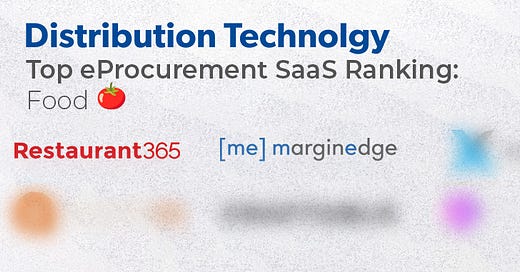In our previous installments, we covered the rise of eProcurement 2.0, exploring its transformative impact on the building materials and auto parts sectors. As promised, we now turn our focus to yet another vertical experiencing significant adoption: the world of B2B food service. And, that means software tools for restaurant operators.
While we have chosen to spotlight the three industries noted above, it is important to recognize that the eProcurement revolution extends into many other verticals. As the market continues to evolve, we anticipate continued growth and penetration, driven by a growing number of SaaS tools eager to provide their SMB customers with an integrated and seamless procurement experience.
Just as we did with construction and auto, our aim is to shine a spotlight on the leading tech tools in the food service sector. We will shed light on their fundraising , market scale, business models, noteworthy collaborations with distributors, retailers, and suppliers, and, of course, the trends that distributors should be leveraging to capitalize on the growing eProcurement market.
eProcurement 2.0 - What You Need To Know 💭
SaaS (software-as-a-service) tech companies have become instrumental in empowering SMBs (small-medium businesses), offering a suite of tools that optimize operations, sales, job dispatching, employee management, and now, supplier procurement. These SaaS tools serve as the modern-day ERP solution for SMBs, tailored to their vertical specific needs and avoiding the excessive complexity and horizontal breadth of traditional ERPs. Over the past two decades, these SaaS solutions have gained significant traction in the SMB market by addressing industry-specific pain points.
When it comes to business models, traditional SaaS tools charge customers a monthly or yearly subscription fee, often with different plan tiers to cater to varying needs. However, eProcurement introduces new avenues for SaaS companies to monetize the vast volumes of materials already being procured by their customers. For instance, ServiceTitan, a prominent player in the building/construction field, processes a remarkable $20 billion in payments. Leveraging this volume, ServiceTitan earns meaningful processing fees especially on any credit card payments.
On the other hand, some SaaS providers offering eProcurement are enabling open-price comparisons to help the SMB always get the best price. Quite a nuisance for distributors. But, even worse, some SaaS tools are charging take-rates, the most contentious fee for a distributor to pay. This showcases the importance of SaaS tools to SMB customers, who rely on the tools to run their entire businesses. Despite distributors' reluctance to pay take-rates, the seamless experience provided by SaaS tools often compels them to comply, highlighting the value and influence these tools have come to possess.
What About Farmers?🥦
While our main list focuses on food service, it’s also worth paying attention to the bracket of SaaS players catering up the value chain to farmers. These companies are changing the way farmers procure supplies, optimize operations, and manage their businesses. With the farmer install base using their SaaS product, they can then introduce tools downstream to other constituents, including distributors. Below are a few key players to watch.
Silo just announced a monster $132mm raise ($32mm Series C round and a $100 million debt facility) led by Koch Disruptive Technologies with participation from Andreessen Horowitz as well.
Silo is a lightweight ERP for produce farmers, helping them run their operations more efficiently and then connecting them to buyers through its wholesale food marketplace
Silo ranked in the 26-50 bracket of our 2022 US B2B Marketplaces Top 50 Ranking. They were also featured in our 2021 report.
Bushel (somewhat quietly) raised $26mm of Series C venture funding from undisclosed investors last week. This raise comes just one day after Silo’s Series C detailed above.
Bushel’s has develop a SaaS solution that connects and enhances the grain trading business from farm to buyer. Bushel’s platform offers software to farmers, co-ops and grain traders - helping them run their respective businesses and enabling trade and commerce.
WholesaleWare is a SaaS ERP provided by GrubMarket. GrubMarket uses WholesaleWare as part of its linear hook strategy, providing a lightweight, cloud ERP to produce distributors at a subsidized rate. In turn, GrubMarket gets access to the suppliers’ data and inventory levels.








